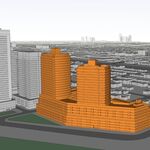Haljackey
Active Member
You've compared Toronto with an extreme example of overbuilding a highway network. I can't say our network doesn't look extensive on that map. Downtown is served by two highways, the Gardiner/QEW and DVP/404. The rest of the city has huge highways. Why would our downtown have more highways? Would it be preferable for Spadina to go from vibrant and historic urban arterial with lots of pedestrians and businesses to a trench with a lot of noise and pollution, surrounded by a dead zone. Vancouver has less developed highway network. Even considering their smaller size, so how do you account for the fact that they're not at the bottom of the list for commutes?
Building more highways is not a good idea. Highways work to dump more cars onto existing arterials. They then have to widened, which can cause a lot of damage to neighbourhoods. It's impossible in the older parts of the city without destroying a lot of what makes this city great: history and cohesive and walkable neighbourhoods. It also requires more wasted land on parking. Transit can handle our commuting needs a lot more efficiently and without the damage.
Actually my intention was to compare it with another city with a similar population to Toronto. I agree that Houston's network is over-bloated, but I just wanted to get the point across that Toronto's highway network is small compared to other major cities in North America.
Actually the downtown is served by one route according to your description. The QEW/Gardiner/DVP/404 is all one route if you continue driving on it.
I never said Toronto/the downtown should have more highways. I just said if it did I'd be willing to bet average commute times would go down based on this report.
-The time for building more highways has long passed. That was so 20th century.
Haljackey, I'm going to agree that we bust up some Toronto neighbourhoods to increase the number of highways.
Under one condition!
You move to Toronto and live next to one of these brand new and oh-so-bloody-necessary highways to commuter heaven.
Ah, right, didn't think so.
A livable city (which short commute times are amongst the indicators of, I'd say) is not achieved by a critical mass of highway infrastructure. Just thought I'd point that out.
Building more highways is just as regressive and oppressive as 90 minute average commute times. Hence, barely the answer to the question.
Check my reply to junctionist, I never said Toronto should build more highways. Of course a livable city is not achieved by a critical mass of highway infrastructure. However a well designed highway network is one step toward lowering commute times, which in turn makes the city more livable. Barcelona's network (#1 on the list) is a prime example of a good highway network.
PS: North American cities are hardly a model to aspire to. Well, maybe they are if you're so convinced of your inalienable right to live 60km from work behind a garage fronting a face-less suburban backwater cul-de-sac, with the supermarket offering so much parking it looks like an air field in sattelite imagery and the drive-through of your favourite "restaurant" no more than ten minutes away and your neighbourhood not being burdened by such mundane and archaic concepts such as character. Well, if that's you....I dare say, the highway is thine destiny!
Wow, where did that come from? I certainly disagree with this statement as I am a advocate for transit and living close to work. No one likes long commute times but I guess there are some people according to your analogy that put it aside to achieve their type of lifestyle. That's certainly not me.
Besides, suburbia is unsustainable. Once gas prices get $2.50-3 and over you're going to see a lot of suburbia and exurbs become ghostowns because of their overreliance on one form of transportation.
Last edited:




